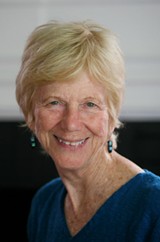[
{
"name": "500x250 Ad",
"insertPoint": "5",
"component": "15667920",
"parentWrapperClass": "",
"requiredCountToDisplay": "1"
}
]
Elaine Miller describes herself as a groupie. The celebrities she follows, though, are cartoonists who specialize in political satire.
Miller has studied and analyzed political cartoons and the artists who create them for decades. The longtime Pittsford resident regularly attends their conventions, lovingly collects their work, and frequently lectures on the intrinsic value of political cartoons to an open society.
"Most often, the best of these cartoons challenge us," she says. "They challenge what we think, and sometimes they challenge what we want to believe is right even though we know it isn't."
These drawings, often rendered in black and white, can elicit a wide range of powerful emotions — laughter, anger, joy, humiliation, and sadness, Miller says.
"They may seem simple, and they are, but I think the distinction is that these cartoons are also artistically accomplished and can be incredibly sophisticated," she says. "A single image can produce a waterfall of associations."
And responses, such as with the 2005 Jyllands-Posten cartoons. The Danish newspaper's 12 cartoons depicting the Prophet Muhammad angered Muslims around the world and prompted a worldwide discussion about freedom of expression and self-censorship.
"Most political cartoons don't solicit that level of a response," Miller says.
The cartoons can also serve as an educational tool, she says, and Miller began using them in the language classes she taught at the College at Brockport to provoke conversation and debate.
"You can adapt them to just about any subject you can think of, but obviously history and social sciences are naturals," she says.
What makes a good political cartoon? Miller says that she always asks the cartoonists that question when she interviews them.
"The artistry — and I believe this is an art form — is essential to a really good cartoon," she says. "The visual has to embody the message. It's all caricature. There is no cartoon without it. If it's true to life, that's portraiture and you can make a joke about it, but that doesn't make it satire."
Miller says that the work of great cartoonists such as three-time Pulitzer Prize-winner Paul Conrad, or Los Angeles Times cartoonist Patrick Oliphant have something in common; they all have an uncanny insight into current events, politics, and power, she says.
But the future for political cartoonists is uncertain, she says.
"Almost every paper had a cartoonist, but with the changes in media, there are about 80 still employed at papers, which is down from about 400 only a decade ago," Miller says. "It's a terrible loss."
Speaking of Politics, Commentary
Latest in News
More by Tim Louis Macaluso
-

RCSD financial crisis builds
Sep 23, 2019 -

RCSD facing spending concerns
Sep 20, 2019 -

Education forum tomorrow night for downtown residents
Sep 17, 2019 - More »









